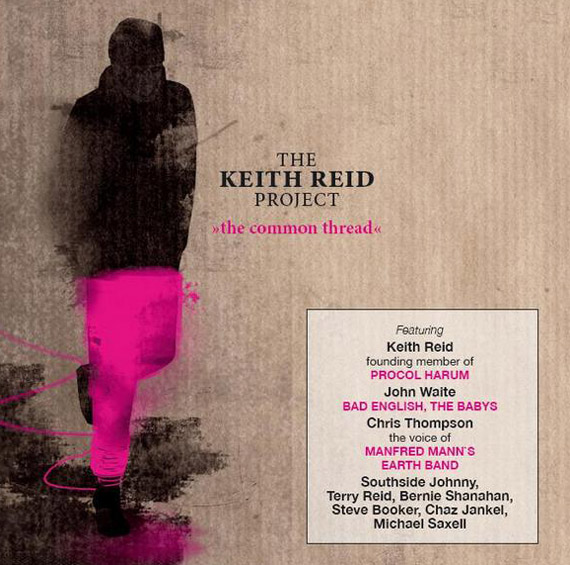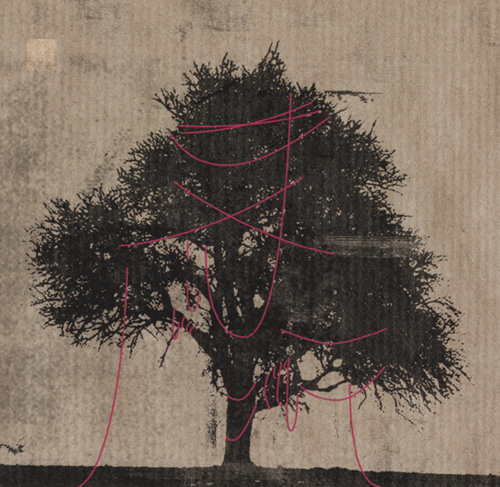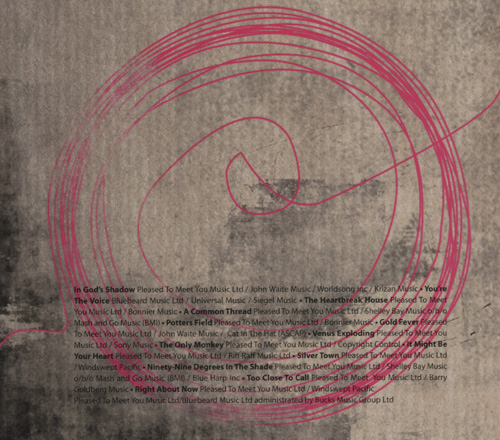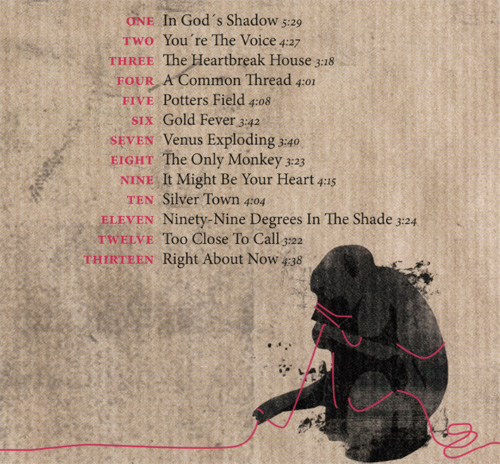From Cerdes to Silver Town
BtP unravels The Common Thread CD from The Keith Reid Project
After
all this time ... more than four decades since his pen first
enthralled the listening world ... a Keith Reid solo album!
 And a solo album of a most unusual sort, held together by the writing of the
words, rather than by any particular composer or performer: it harbours music of
many styles, and features many voices: and it's all very appetising, moreish
stuff. Reid himself is the eponymous 'thread', and the CD graphics
(by guitarist / Dylan-illustrator
Eugen Kern-Emden) make this clear: on the front cover a pink-trousered figure – an everyman
figure, or the lyricist himself? – walks into the frame, trailing a thread that on other pages appears festooned among the branches of a
tree (no worm in sight), then encircling the publisher-details, and latterly, on the
back cover, in the grasp of a crouching ape. Is the ape reeling this umbilicus
in, or paying it out? The relationship between man and monkey will be made
explicit as the album unfurls!
And a solo album of a most unusual sort, held together by the writing of the
words, rather than by any particular composer or performer: it harbours music of
many styles, and features many voices: and it's all very appetising, moreish
stuff. Reid himself is the eponymous 'thread', and the CD graphics
(by guitarist / Dylan-illustrator
Eugen Kern-Emden) make this clear: on the front cover a pink-trousered figure – an everyman
figure, or the lyricist himself? – walks into the frame, trailing a thread that on other pages appears festooned among the branches of a
tree (no worm in sight), then encircling the publisher-details, and latterly, on the
back cover, in the grasp of a crouching ape. Is the ape reeling this umbilicus
in, or paying it out? The relationship between man and monkey will be made
explicit as the album unfurls!

There is a further, unseen thread: Reid's words as they have unspooled
progressively in
the minds of Procol Harum
fans, gradually shifting in tone – from dreamlike through doomladen towards
danceability, from sensual through self-referential towards sentimentality. To
those who grew up listening to early Procol his lyrics seemed axiomatically
irreducible, stubbornly resisting any single meaning: they were allusive,
rhetorical, spiked with mischievous humour and threatened by an undertow of
melancholy verging at times on the nihilistic. Only in later albums did his
writing become more transparent: songs such as One More Time on
The Prodigal Stranger, for instance, might have been written for and sung
by any band, and seemed less Procolesque in consequence. But there is more to
Reid than his Procol work, as
this page attests: we
have latterly come to know him as a jobbing songsmith, providing lyrics for a variety of
singers and composers, working in popular markets where we could scarcely expect to find
the Valkyries, pygmies, and other typewriter torments that
distinguished the Old Testament Procol years.
 So, to the current album, in which his collaborations with some top
singers and composers are released under the umbrella title of 'The Keith
Reid Project'. It opens very strongly with John Waite's emotional and appealingly
melodic In God's Shadow, a powerful set of
words that fans already know from Reid's
My Own Choice
lyric-book collection. There are some small differences of emphasis between this
song and the printed version ('but' for 'and' and so on): but intriguingly
Waite's version adds a couple of
lines to the earlier text, and these appear in parentheses in the CD booklet.
There's a more significant change too, where 'this matter of existence, our ship
wasn't built to last' becomes 'this matter of resistance, our ship was
built to last': perhaps singability trumped significance when these words made
it from the page into the recording studio; or perhaps, as Keith now suspects,
there was a typo in Charnel House's printed edition. The 2008 release is, of course, a
different recording from the one issued on Waite's 1995 album, Temple Bar:
none of the music on The Common Thread has been officially heard before. The
1995 recording was
rather heavier, with piano and a more prominent guitar part weaving around the
voice. The new version is a very radio-friendly track:
lead guitar rides over strummed acoustics, and bass and drums give a strong
forward impetus: the harmonies are slightly Procolesque as the bassline rides up
through the chord-inversions into a very hummable and powerful chorus. There's much here
to please any Procol fan: 'we're sailing out on troubled seas: nail our colours to the mast'
as well as the existential content, as 'life's certainties slip
away' and we finally 'lie down in God's shadow'. The current version is dedicated to
Frankie LaRocka, the
New York A&R man who is also name-checked on The Prodigal Stranger liner-note:
as John Waite's drummer, he introduced Reid to the musicians who wrote this song
(Waite is British by birth, but has lived in the USA for many years). It would
be nice to know exactly who plays in the band but, as with all subsequent
pieces, these details are omitted: 'Played arranged and produced by ...
' is the formula for every track, and the names following are usually those of
the composers and Reid himself. This throws the emphasis squarely on the singing
and the writing, which is evidently the compilers' intention.
So, to the current album, in which his collaborations with some top
singers and composers are released under the umbrella title of 'The Keith
Reid Project'. It opens very strongly with John Waite's emotional and appealingly
melodic In God's Shadow, a powerful set of
words that fans already know from Reid's
My Own Choice
lyric-book collection. There are some small differences of emphasis between this
song and the printed version ('but' for 'and' and so on): but intriguingly
Waite's version adds a couple of
lines to the earlier text, and these appear in parentheses in the CD booklet.
There's a more significant change too, where 'this matter of existence, our ship
wasn't built to last' becomes 'this matter of resistance, our ship was
built to last': perhaps singability trumped significance when these words made
it from the page into the recording studio; or perhaps, as Keith now suspects,
there was a typo in Charnel House's printed edition. The 2008 release is, of course, a
different recording from the one issued on Waite's 1995 album, Temple Bar:
none of the music on The Common Thread has been officially heard before. The
1995 recording was
rather heavier, with piano and a more prominent guitar part weaving around the
voice. The new version is a very radio-friendly track:
lead guitar rides over strummed acoustics, and bass and drums give a strong
forward impetus: the harmonies are slightly Procolesque as the bassline rides up
through the chord-inversions into a very hummable and powerful chorus. There's much here
to please any Procol fan: 'we're sailing out on troubled seas: nail our colours to the mast'
as well as the existential content, as 'life's certainties slip
away' and we finally 'lie down in God's shadow'. The current version is dedicated to
Frankie LaRocka, the
New York A&R man who is also name-checked on The Prodigal Stranger liner-note:
as John Waite's drummer, he introduced Reid to the musicians who wrote this song
(Waite is British by birth, but has lived in the USA for many years). It would
be nice to know exactly who plays in the band but, as with all subsequent
pieces, these details are omitted: 'Played arranged and produced by ...
' is the formula for every track, and the names following are usually those of
the composers and Reid himself. This throws the emphasis squarely on the singing
and the writing, which is evidently the compilers' intention.
 The second offering is the 'original version'
of
You're the Voice, Reid's other number one
record (so far!), sung by its co-composer Chris Thompson, of Manfred Mann's
Earthband fame. John Farnham's chart-topping version clearly followed this
prototype very closely, though it dropped a whole tone, into F major, perhaps to allow him
easier access to the falsetto notes that Chris Thompson finds so effortlessly here.
This 1980s recording has a bit of period synth-percussion, yet the album is so
well-mastered – by Fred Kevorkian, known for work with Ryan
Adams, Willie Nelson, The White Stripes, Dave Matthews Band, Iggy Pop a.o. –
that the tracks' very diverse origins do not impinge on the ear at all.
It's otherwise a good deal less poppy, more demanding, than
the famous version with its compressed piano and its skirling bagpipe break. In
particular, Chris Thompson's version uses a pedal bass note in the chorus,
whereas Farnham's bassist followed the chord-changes. Thompson's bassist gets a
good break towards the end of the song, though; elsewhere there's a sax tootling
away that spawned no equivalent in the Farnham version. Lyrically this track is very
assertive and inclusive: we share 'the power to be powerful' and we
can 'write what we wanna write'; but it is also somewhat generic, in that the
exact cause for the fighting is not specified. 'We have a chance to turn the
pages over' suggests a clean start, a wish to close the book on a period of
gun-dominated history: Procol-lovers will note a kinship of imagery with (You
Can't) Turn Back the Page. Unlike many of the pieces on this album, Keith wrote
the words to an existing melodic outline provided by Chris Thompson.
The two men got
to know each other after meeting at a studio: Chris is of course the co-composer of a
Procol tune, The Hand that Rocks the Cradle. How ironic that Thompson's
Voice was not released on the solo-album he was then working on, since his
producers didn't see its commercial potential: yet the song achieved world-wide
fame, and has since been
covered by artists as diverse as Alan Parsons, Barbara Dickson, John Miles and
Brenda Cochrane.
The second offering is the 'original version'
of
You're the Voice, Reid's other number one
record (so far!), sung by its co-composer Chris Thompson, of Manfred Mann's
Earthband fame. John Farnham's chart-topping version clearly followed this
prototype very closely, though it dropped a whole tone, into F major, perhaps to allow him
easier access to the falsetto notes that Chris Thompson finds so effortlessly here.
This 1980s recording has a bit of period synth-percussion, yet the album is so
well-mastered – by Fred Kevorkian, known for work with Ryan
Adams, Willie Nelson, The White Stripes, Dave Matthews Band, Iggy Pop a.o. –
that the tracks' very diverse origins do not impinge on the ear at all.
It's otherwise a good deal less poppy, more demanding, than
the famous version with its compressed piano and its skirling bagpipe break. In
particular, Chris Thompson's version uses a pedal bass note in the chorus,
whereas Farnham's bassist followed the chord-changes. Thompson's bassist gets a
good break towards the end of the song, though; elsewhere there's a sax tootling
away that spawned no equivalent in the Farnham version. Lyrically this track is very
assertive and inclusive: we share 'the power to be powerful' and we
can 'write what we wanna write'; but it is also somewhat generic, in that the
exact cause for the fighting is not specified. 'We have a chance to turn the
pages over' suggests a clean start, a wish to close the book on a period of
gun-dominated history: Procol-lovers will note a kinship of imagery with (You
Can't) Turn Back the Page. Unlike many of the pieces on this album, Keith wrote
the words to an existing melodic outline provided by Chris Thompson.
The two men got
to know each other after meeting at a studio: Chris is of course the co-composer of a
Procol tune, The Hand that Rocks the Cradle. How ironic that Thompson's
Voice was not released on the solo-album he was then working on, since his
producers didn't see its commercial potential: yet the song achieved world-wide
fame, and has since been
covered by artists as diverse as Alan Parsons, Barbara Dickson, John Miles and
Brenda Cochrane.
 The music takes a sparser turn for the minor-key
The Heartbreak House, sung and
composed by Michael Saxell. Saxell is Swedish, but no trace of
this shows in his voice: he's entirely at home in the lingua franca of
male rock styling. There's a tinge of Dylan in the world-weary vocal of this anti-military ditty, which
is also played with a slightly Dylanesque feel, Oh Mercy-period guitar jangling and up-front
drums, and plenty of dynamic contrast following the story. A nameless
woman has fallen for a military man, and pays the inevitable price:
lyrically there are some predictable moments, but they're easy to
overlook amid arcane images like growing cobwebs and aching floorboards
(presumably in the latter case there is a pun, conscious or otherwise, on the
word 'pine'). At 3:18 this is the shortest track on the album, and it's
very catchy. How did Reid team up with Saxell? Almost unbelievably, he was
head-hunted by an intermediary in a telephone call that began, 'My name
is Ingmar Bergman, and I'm a great admirer of your work ...'. Keith
relates that he responded by saying that he was a great admirer of
Bergman's work ... but it turned out to be a different Bergman! Reid's American connections
can be heard in the sound-world presented here: Saxell originally recorded just guitar and voice, in Sweden: Keith saw
the piece rather differently and took it to upstate New York where the
additional instruments were added, and where it was mixed. It's by no
means the only track on the album to have covered a lot of ground during
its gestation.
The music takes a sparser turn for the minor-key
The Heartbreak House, sung and
composed by Michael Saxell. Saxell is Swedish, but no trace of
this shows in his voice: he's entirely at home in the lingua franca of
male rock styling. There's a tinge of Dylan in the world-weary vocal of this anti-military ditty, which
is also played with a slightly Dylanesque feel, Oh Mercy-period guitar jangling and up-front
drums, and plenty of dynamic contrast following the story. A nameless
woman has fallen for a military man, and pays the inevitable price:
lyrically there are some predictable moments, but they're easy to
overlook amid arcane images like growing cobwebs and aching floorboards
(presumably in the latter case there is a pun, conscious or otherwise, on the
word 'pine'). At 3:18 this is the shortest track on the album, and it's
very catchy. How did Reid team up with Saxell? Almost unbelievably, he was
head-hunted by an intermediary in a telephone call that began, 'My name
is Ingmar Bergman, and I'm a great admirer of your work ...'. Keith
relates that he responded by saying that he was a great admirer of
Bergman's work ... but it turned out to be a different Bergman! Reid's American connections
can be heard in the sound-world presented here: Saxell originally recorded just guitar and voice, in Sweden: Keith saw
the piece rather differently and took it to upstate New York where the
additional instruments were added, and where it was mixed. It's by no
means the only track on the album to have covered a lot of ground during
its gestation.

 A Common Thread
is another lyric encountered in the
My
Own Choice collection, although there it is called 'The Common
Thread' like the present CD album.
Southside Johnny
gives a stirring account of Reid's words, making no changes bar the
addition of a soulful 'Yes it does' (which is bracketed in the CD's lyric
booklet). Here again we encounter the idea that 'there's a voice ...
that belongs to all of us', somehow a far cry from the frequently
alienated world of early-period Reid (but never fear: we haven't got to
the monkey song yet!). A Common Thread starts, as Reid is wont to
do, by capturing the listener with a well-known phrase – 'hearts of oak'
– which he mutates later to 'hearts of gold' – while cataloguing the
earthy artisan virtues that hold our lives together, and contrasting
them with the (literally, middle-class) activities of those 'just busy making deals'. The rueful
moral seems to be that physical work is 'a story that everybody needs, but nobody
heeds'. The 'thread' image is skilfully exploited for a double meaning,
signifying a unifying theme as well an item of haberdashery: the whole piece works extremely well.
Thread is the first song on the album whose instrumentation is
thoroughly Procolesque: piano, Hammond, guitar, bass and drums introduce
a chord sequence (the music is by Procol collaborator Matt Noble) that
echoes Air on a G String, albeit in A major. Although space
constraints again
preclude a full who-did-what, the brass arranger, keyboardist
Barry Goldberg,
does get an individual – and well-deserved – credit. This is a big,
mellow ballad, the sort that Joe Cocker has made his own: it would be a
pleasure to hear those tonsils wrapped around this piece, perhaps earning Reid some more of the contemporary exposure he so obviously
merits. Yet Southside Johnny's performance is excellent, and highlights
one of the major selling-points of this album: it contains a profusion
of strikingly good singers. Perhaps nobody matches the poignant clarity and
drama of Gary Brooker's delivery, but undoubtedly nobody is trying to –
quite rightly so. There
are several songs here, however, that it would be good to hear Brooker tackle. We might wonder if any of these
words are lingering, unset, in
the large album of Reid lyrics to which Brooker turns when writing new
material;
but my understanding is that Keith doesn't typically like to send the same lyric out
to more than one composer, and the instances (Into the Flood, Victims
of the Fury) where different Trower and Brooker settings are extant
have come about only because Gary had sat on the words so long
that they were offered afresh and in good faith to Robin, whose versions didn't come to
Brooker's notice until after his own composing was done.
A Common Thread
is another lyric encountered in the
My
Own Choice collection, although there it is called 'The Common
Thread' like the present CD album.
Southside Johnny
gives a stirring account of Reid's words, making no changes bar the
addition of a soulful 'Yes it does' (which is bracketed in the CD's lyric
booklet). Here again we encounter the idea that 'there's a voice ...
that belongs to all of us', somehow a far cry from the frequently
alienated world of early-period Reid (but never fear: we haven't got to
the monkey song yet!). A Common Thread starts, as Reid is wont to
do, by capturing the listener with a well-known phrase – 'hearts of oak'
– which he mutates later to 'hearts of gold' – while cataloguing the
earthy artisan virtues that hold our lives together, and contrasting
them with the (literally, middle-class) activities of those 'just busy making deals'. The rueful
moral seems to be that physical work is 'a story that everybody needs, but nobody
heeds'. The 'thread' image is skilfully exploited for a double meaning,
signifying a unifying theme as well an item of haberdashery: the whole piece works extremely well.
Thread is the first song on the album whose instrumentation is
thoroughly Procolesque: piano, Hammond, guitar, bass and drums introduce
a chord sequence (the music is by Procol collaborator Matt Noble) that
echoes Air on a G String, albeit in A major. Although space
constraints again
preclude a full who-did-what, the brass arranger, keyboardist
Barry Goldberg,
does get an individual – and well-deserved – credit. This is a big,
mellow ballad, the sort that Joe Cocker has made his own: it would be a
pleasure to hear those tonsils wrapped around this piece, perhaps earning Reid some more of the contemporary exposure he so obviously
merits. Yet Southside Johnny's performance is excellent, and highlights
one of the major selling-points of this album: it contains a profusion
of strikingly good singers. Perhaps nobody matches the poignant clarity and
drama of Gary Brooker's delivery, but undoubtedly nobody is trying to –
quite rightly so. There
are several songs here, however, that it would be good to hear Brooker tackle. We might wonder if any of these
words are lingering, unset, in
the large album of Reid lyrics to which Brooker turns when writing new
material;
but my understanding is that Keith doesn't typically like to send the same lyric out
to more than one composer, and the instances (Into the Flood, Victims
of the Fury) where different Trower and Brooker settings are extant
have come about only because Gary had sat on the words so long
that they were offered afresh and in good faith to Robin, whose versions didn't come to
Brooker's notice until after his own composing was done.
 Next, a song about a graveyard. Potters Field is
a generic name for
strangers' burial-grounds, but after name-checking Judas and 'his Lord' Reid
focuses on the weed-choked Potters Field on Hart Island, off Long Island Sound,
the largest cemetery in the USA: it's one of
several songs on the album to centre upon a particular place, real or otherwise.
The lyric deals with two inhabitants of this graveyard, one 'refugee from a
far-off land' whose 'dreams were bought and sold'; the other a young woman
who turns to selling herself to fuel a drug habit and 'got too high, or maybe
she forgot to fly'. There is a kind of melancholy word-play in 'they laid her
low', as the burials are described, and some real Liquorice John imagery
in 'she hit the ground in Potters Field' (the placename no more needs an
apostrophe than Shepherds Bush does, by the way). So far, so Procoloid: but the mood here
is tinged with folk, as the track starts with just two steel-strung guitars,
finger-picked with plenty of fret-squeak, later joined by unobtrusive bass:
Bernie Shanahan sings this
plaintive piece (composed by Michael Saxell) with great feeling: the album is on the whole very much a
sung sequence, with relatively-few featured instrumental passages. Latterly
the choruses feature multi-tracked vocals, and it's easy to imagine this song
being performed in a folk-club, extracting maximum effect from a minimum of
technical resources.
Next, a song about a graveyard. Potters Field is
a generic name for
strangers' burial-grounds, but after name-checking Judas and 'his Lord' Reid
focuses on the weed-choked Potters Field on Hart Island, off Long Island Sound,
the largest cemetery in the USA: it's one of
several songs on the album to centre upon a particular place, real or otherwise.
The lyric deals with two inhabitants of this graveyard, one 'refugee from a
far-off land' whose 'dreams were bought and sold'; the other a young woman
who turns to selling herself to fuel a drug habit and 'got too high, or maybe
she forgot to fly'. There is a kind of melancholy word-play in 'they laid her
low', as the burials are described, and some real Liquorice John imagery
in 'she hit the ground in Potters Field' (the placename no more needs an
apostrophe than Shepherds Bush does, by the way). So far, so Procoloid: but the mood here
is tinged with folk, as the track starts with just two steel-strung guitars,
finger-picked with plenty of fret-squeak, later joined by unobtrusive bass:
Bernie Shanahan sings this
plaintive piece (composed by Michael Saxell) with great feeling: the album is on the whole very much a
sung sequence, with relatively-few featured instrumental passages. Latterly
the choruses feature multi-tracked vocals, and it's easy to imagine this song
being performed in a folk-club, extracting maximum effect from a minimum of
technical resources.
 On the other hand the instrumental playing on
Gold Fever
is unmissable, showily virtuosic. Co-composer
Jeff Golub sounds
like Manitas de Plata as his flamenco guitar scampers all over this
hectic, Latino-oriented offering. On one level it harks back to the
Californian gold-rush,
but the imagery resonates more with contemporary life in LA's Tinseltown:
the male character has a script under consideration, but isn't
considered bankable: he's known the high life, having made some money
'before the boom went splash' (classic Reid catachresis here!), but now turns,
like the girl in
the previous song, to 'a silver spoon' – ironically divorced from its
usual, upbeat metaphorical meaning. In its treatment of betrayal, the song
carries a hint of the world of Wall
Street Blues. It's not quite clear to me how the first verse relates
to the rest of this song: it begins with 'a struggle on the
causeway' and a lapse 'of sacred trust'. But this non-linearity isn't a defect for
the Procol fan: after 38 years of listening I still can't get Whaling
Stories to come into focus fully and I'm sure it's not meant to.
Musically, this track is a highlight: John Waite's delivery is terrific
– again, more than a hint of Dylan,
Blood on the Tracks period perhaps – and the slightly astringent
relation of the tune to the chordal accompaniment is deliciously
haunting. Insistent handclaps complete the Hispanic soundworld.
Memo to self: listen to more Waite. Intriguingly, considering the fact that Reid's songwriting life has been
divided between Britain and the USA, the lyric booklet uses the
transAtlantic 'honor' alongside the native 'jewellery': what are we to
make of this!
On the other hand the instrumental playing on
Gold Fever
is unmissable, showily virtuosic. Co-composer
Jeff Golub sounds
like Manitas de Plata as his flamenco guitar scampers all over this
hectic, Latino-oriented offering. On one level it harks back to the
Californian gold-rush,
but the imagery resonates more with contemporary life in LA's Tinseltown:
the male character has a script under consideration, but isn't
considered bankable: he's known the high life, having made some money
'before the boom went splash' (classic Reid catachresis here!), but now turns,
like the girl in
the previous song, to 'a silver spoon' – ironically divorced from its
usual, upbeat metaphorical meaning. In its treatment of betrayal, the song
carries a hint of the world of Wall
Street Blues. It's not quite clear to me how the first verse relates
to the rest of this song: it begins with 'a struggle on the
causeway' and a lapse 'of sacred trust'. But this non-linearity isn't a defect for
the Procol fan: after 38 years of listening I still can't get Whaling
Stories to come into focus fully and I'm sure it's not meant to.
Musically, this track is a highlight: John Waite's delivery is terrific
– again, more than a hint of Dylan,
Blood on the Tracks period perhaps – and the slightly astringent
relation of the tune to the chordal accompaniment is deliciously
haunting. Insistent handclaps complete the Hispanic soundworld.
Memo to self: listen to more Waite. Intriguingly, considering the fact that Reid's songwriting life has been
divided between Britain and the USA, the lyric booklet uses the
transAtlantic 'honor' alongside the native 'jewellery': what are we to
make of this!

 A
glance at the mere track-listing might suggest that Venus
Exploding would be a comic song involving iconic statuary
and gelignite, but that's far from the case: the Venus in
question is the planet, and the context is cataclysmic. The night sky is on fire, the stars fall down, yet
it starts gently, in a far-away, melodic mood, like an offering
from The Prodigal
Stranger, and has similar compound-time feel to Perpetual Motion.
Composer Matt Noble, of course, is credited as a co-author of that late Procol
track, and this is the song that most-closely approximates to
the Harum sound-world: piano-chords alternate over a held bass
note, heavy guitar emphasises the movement of the bassline when
it eventually detaches itself from root position. The grandiloquent
drums also recall the dramatic punctuations of BJ Wilson, but
here they are heavily-processed, so the instrumental track doesn't entirely
sound like a live band, but rather diverts the mind's ear to the
multi-track studio. The song slows to a definite, stately
conclusion, yet guitar and piano play on, momentarily, into an
unexpected semi-fade. The words involve searching for some meaning
when 'the signs were deceiving'. An eerie atmosphere prevails,
though latter-day Reid is more wont to spell it out ('a strange
misty haze') than in former, more allusive times. Nevertheless
lines like 'lost in the mirror' take us through The Hand that
Rocks the Cradle right back to the days
of A Whiter Shade of Pale, and there is a fascinating
instance of Thomas Hardy-style 'cunning irregularity' in
that 'tossed between dreams and awakening', in the first verse,
mutates to 'lost between truth and awakening' in the second.
Similarly the opening chorus is first-person past-tense, the
closing one second-person future. Bernie Shanahan's performance is strong,
his voice warm, but
arguably he is fulfilling the role of identikit rock balladeer, rather than that
of an alienated visionary searching for meaning (the soaring guitar
solo is similarly generic). I found him more affecting on Potters Field,
but this is still an excellent track, whose haunting, hymn-like
chorus sticks deliciously in the mind, with the utter simplicity
of a classic.
A
glance at the mere track-listing might suggest that Venus
Exploding would be a comic song involving iconic statuary
and gelignite, but that's far from the case: the Venus in
question is the planet, and the context is cataclysmic. The night sky is on fire, the stars fall down, yet
it starts gently, in a far-away, melodic mood, like an offering
from The Prodigal
Stranger, and has similar compound-time feel to Perpetual Motion.
Composer Matt Noble, of course, is credited as a co-author of that late Procol
track, and this is the song that most-closely approximates to
the Harum sound-world: piano-chords alternate over a held bass
note, heavy guitar emphasises the movement of the bassline when
it eventually detaches itself from root position. The grandiloquent
drums also recall the dramatic punctuations of BJ Wilson, but
here they are heavily-processed, so the instrumental track doesn't entirely
sound like a live band, but rather diverts the mind's ear to the
multi-track studio. The song slows to a definite, stately
conclusion, yet guitar and piano play on, momentarily, into an
unexpected semi-fade. The words involve searching for some meaning
when 'the signs were deceiving'. An eerie atmosphere prevails,
though latter-day Reid is more wont to spell it out ('a strange
misty haze') than in former, more allusive times. Nevertheless
lines like 'lost in the mirror' take us through The Hand that
Rocks the Cradle right back to the days
of A Whiter Shade of Pale, and there is a fascinating
instance of Thomas Hardy-style 'cunning irregularity' in
that 'tossed between dreams and awakening', in the first verse,
mutates to 'lost between truth and awakening' in the second.
Similarly the opening chorus is first-person past-tense, the
closing one second-person future. Bernie Shanahan's performance is strong,
his voice warm, but
arguably he is fulfilling the role of identikit rock balladeer, rather than that
of an alienated visionary searching for meaning (the soaring guitar
solo is similarly generic). I found him more affecting on Potters Field,
but this is still an excellent track, whose haunting, hymn-like
chorus sticks deliciously in the mind, with the utter simplicity
of a classic.
 The Only Monkey is the album's most recently-recorded track. It's a
stingingly satirical swipe at homo sapiens, mordant, insistent, and
bleakly hilarious. 'The human is a monkey with a diseased brain' (later 'heart',
latterly 'soul') in Reid's vision: he 'makes killing a game', 'takes pleasure
from pain', 'blows things apart', and – uniquely in the animal world – he 'needs
things to do' and is 'in search of a goal'. The middle-eight section runs, 'he'll
sell his own soul for a gallon of gas' (not 'petrol' as it's known in the UK!),
'turn trees into paper to wipe his own ass'. This sort of scathing wit is worth
reams of pious eco-cant, and it is brilliantly set to music by a collaborator
Reid has long admired, the marvellous
Chaz Jankel, who is still
touring with The Blockheads, and must have welcomed the chance to work with a
lyric on a par with the late Ian Dury's best inspirations. Biological pedants will flinch at the
category error in 'from the mightiest ape to the tiny boll weevil, the only
monkey that you can call evil' but in fact this literal inaccuracy only adds to
the fun: likewise, the way the savagery of the verses, whose key-word is
'diseased', gives over to a playground-taunting chorus where the central notion
is the weedily-repeated 'silly'. No stranger to the top of the charts, Jankel has come up with an catchy, unpretentious, danceable ditty:
he hits us with his rhythm stick, as it were, with steady drumming, offbeat guitaring, and plonking wah-wah clavinet. What sounds
simple is kept interesting with subtle variations, such as a thread of backward guitar, some Beatlish arpeggiations,
foolish toy-noises, and a cracking solo guitar break.
A repeated and highly unconventional jump-cut from G minor to A flat major and back adds
a Squeeze-like freshness and
individuality. BtP asked Keith Reid if he could be heard anywhere on the album,
and he conceded that he was audible, but declined to be specific: my guess is
that his voice is involved in the amusingly-distorted call-and-response vocal.
It's all neatly-rhymed, except for 'earth' and 'self', which curiously retreads
the least euphonious couplet in The Emperor's New Clothes: 'You promise
the moon and squander the earth / The only person you fool is yourself'. If I
had my pick The Only Monkey would be the single from the album: punchy,
pointed, modern in sound, and full of provoking soundbites: 'the
human is the monkey who invented the Zoo ...' (I wonder if the capital letter in
the lyric-booklet harks back to Procol's briefly-supportive 1990s record-label?)
The Only Monkey is the album's most recently-recorded track. It's a
stingingly satirical swipe at homo sapiens, mordant, insistent, and
bleakly hilarious. 'The human is a monkey with a diseased brain' (later 'heart',
latterly 'soul') in Reid's vision: he 'makes killing a game', 'takes pleasure
from pain', 'blows things apart', and – uniquely in the animal world – he 'needs
things to do' and is 'in search of a goal'. The middle-eight section runs, 'he'll
sell his own soul for a gallon of gas' (not 'petrol' as it's known in the UK!),
'turn trees into paper to wipe his own ass'. This sort of scathing wit is worth
reams of pious eco-cant, and it is brilliantly set to music by a collaborator
Reid has long admired, the marvellous
Chaz Jankel, who is still
touring with The Blockheads, and must have welcomed the chance to work with a
lyric on a par with the late Ian Dury's best inspirations. Biological pedants will flinch at the
category error in 'from the mightiest ape to the tiny boll weevil, the only
monkey that you can call evil' but in fact this literal inaccuracy only adds to
the fun: likewise, the way the savagery of the verses, whose key-word is
'diseased', gives over to a playground-taunting chorus where the central notion
is the weedily-repeated 'silly'. No stranger to the top of the charts, Jankel has come up with an catchy, unpretentious, danceable ditty:
he hits us with his rhythm stick, as it were, with steady drumming, offbeat guitaring, and plonking wah-wah clavinet. What sounds
simple is kept interesting with subtle variations, such as a thread of backward guitar, some Beatlish arpeggiations,
foolish toy-noises, and a cracking solo guitar break.
A repeated and highly unconventional jump-cut from G minor to A flat major and back adds
a Squeeze-like freshness and
individuality. BtP asked Keith Reid if he could be heard anywhere on the album,
and he conceded that he was audible, but declined to be specific: my guess is
that his voice is involved in the amusingly-distorted call-and-response vocal.
It's all neatly-rhymed, except for 'earth' and 'self', which curiously retreads
the least euphonious couplet in The Emperor's New Clothes: 'You promise
the moon and squander the earth / The only person you fool is yourself'. If I
had my pick The Only Monkey would be the single from the album: punchy,
pointed, modern in sound, and full of provoking soundbites: 'the
human is the monkey who invented the Zoo ...' (I wonder if the capital letter in
the lyric-booklet harks back to Procol's briefly-supportive 1990s record-label?)

 A diametrical shift of emphasis brings us to a big ballad,
It Might Be Your Heart,
sung by Chris Thompson, who wrote the music with keyboardist Mark Taylor. Procol-fanciers will be immediately struck by the featured phrase
'too much between us' in the chorus: in 1969 this was the enigmatic title of
Procol's tenderest piece to date, depicting lovers separated by the Atlantic,
and where 'between us' compendiously signified – and emphasised the
incompatibility of – simultaneous separation and mutual affection. That early song left
everything to the imagination: in Blakean terms, it was born of innocence rather
than experience. It's no surprise that, so many years later, Reid now writes
more from the latter point-of-view. This is presumably what people call 'AOR' – it lacks the Juvenile-Oriented Rock elements that made the
Monkey track such fun
– as it poses the middle-aged question of how 'a lifetime of growing together'
can be 'over so fast'. The lyric is not afraid to preach ('if you take love for
granted then love disappears') nor does it shy away from the stock-in-trade dependables of 'your whole world falls down / and skies full of dreams / come
crashing to the ground'. No doubt there is a big market for this kind of work,
and no doubt this is a satisfyingly well-done example of its kind: but it did not chime with this particular reviewer greatly, though the melody
is catchy enough. 'What can I do / With this space between me and you', Thompson emotes
authentically over piano, organ, bass and drums, with guitar offbeat clipping:
midway it grows orchestration and female backing-voices. Despite a similarity to
Crucifiction Lane in terms of tempo, this is nothing like Procol Harum music,
and it's as
well to remember that the album is not specifically aimed at fans of that band.
For all I know this is the piece of The Common Thread that will get the most air-play, or attract
the most cover-versions. Reid mentioned in conversation that 'It will be
interesting to know if [the BtP public] think any of this is like Procol Harum'
but added that 'I don't write Procol Harum words specifically'. As a working
songwriter, compiling a sampler CD of 'words I'm really proud of', he is
showing a full, and enviable, range on this recording.
A diametrical shift of emphasis brings us to a big ballad,
It Might Be Your Heart,
sung by Chris Thompson, who wrote the music with keyboardist Mark Taylor. Procol-fanciers will be immediately struck by the featured phrase
'too much between us' in the chorus: in 1969 this was the enigmatic title of
Procol's tenderest piece to date, depicting lovers separated by the Atlantic,
and where 'between us' compendiously signified – and emphasised the
incompatibility of – simultaneous separation and mutual affection. That early song left
everything to the imagination: in Blakean terms, it was born of innocence rather
than experience. It's no surprise that, so many years later, Reid now writes
more from the latter point-of-view. This is presumably what people call 'AOR' – it lacks the Juvenile-Oriented Rock elements that made the
Monkey track such fun
– as it poses the middle-aged question of how 'a lifetime of growing together'
can be 'over so fast'. The lyric is not afraid to preach ('if you take love for
granted then love disappears') nor does it shy away from the stock-in-trade dependables of 'your whole world falls down / and skies full of dreams / come
crashing to the ground'. No doubt there is a big market for this kind of work,
and no doubt this is a satisfyingly well-done example of its kind: but it did not chime with this particular reviewer greatly, though the melody
is catchy enough. 'What can I do / With this space between me and you', Thompson emotes
authentically over piano, organ, bass and drums, with guitar offbeat clipping:
midway it grows orchestration and female backing-voices. Despite a similarity to
Crucifiction Lane in terms of tempo, this is nothing like Procol Harum music,
and it's as
well to remember that the album is not specifically aimed at fans of that band.
For all I know this is the piece of The Common Thread that will get the most air-play, or attract
the most cover-versions. Reid mentioned in conversation that 'It will be
interesting to know if [the BtP public] think any of this is like Procol Harum'
but added that 'I don't write Procol Harum words specifically'. As a working
songwriter, compiling a sampler CD of 'words I'm really proud of', he is
showing a full, and enviable, range on this recording.
 Silver Town, sung by
Steve Booker, is a delectable number with a folkish feel. The British
songwriter-producer's own MySpace bills him as 'Pop/Acoustic/Soul', and he's best-known as
the author of Duffy's massive 2008 summer hit, Mercy, currently topping the 1.5m sales mark. Reid and Booker were put in
touch by publishers, maybe by Simon Platz, who is credited in the CD
booklet for 'taking care of business': yet Steve's roster of
collaborations,
here, rather curiously doesn't include either of the Booker/Reid
(!) songs on this album. He has a very agreeable, carefully-controlled
voice, bereft of posturing. The chorus is delightful, strongly haunting
(incidentally, it shares its IV-V-I harmonies with the similarly-strong
refrain to Venus Exploding): this is another piece one could
imagine sung by massed voices in a folk-club setting. Interviewed
earlier this year for
The Argotist,
Reid divulged ' ... my definition of a great
song would be something that can be put across with very limited
instrumentation ... it's all the devices of rhyming schemes, hooks,
choruses etc. that contribute to making a song memorable ... if you've just got a guitar and a voice your
song has to be special in order to survive.' This poignant narrative
song is certainly a survivor. The opening line, 'This town's been blown away', immediately calls to mind London's disastrous
Silvertown explosion
in 1917, yet the repeated allusions to 'Washington' show that once
again the setting is not British but American. Yet this Silver Town is
an imaginary place, intended to symbolise any small community ('built
from a grain of sand') whose fate is dependent on a remote government.
'It's talking about the relationship between big business and
administration,' Keith told BtP. The contrast between this fictional
place and Cerdes (Outside the Gates of) neatly epitomises
another
transition in Reid's songwriting over forty years, from 1967's
disturbing, surreal fancies to today's topical, politically-pointed
narratives. There is, it seems, a humorous
reference, a pun, somewhere in this lyric, and Keith thinks BtP should offer a
prize to the first reader to
write in explaining it. I confess that it eludes this reviewer,
though there is nonetheless plenty of felicitous wordplay: 'blew (?blue)
us out of the sky', 'though the money's all run out / there's a wealth
of folk', 'When they turned up the heat in Washington / they left us out
in the cold'. Skilfully painting the small-town scene, in few words,
Reid evokes the railway and the church: 'the wheels still turn ... the
bells ring out of time'. The song asks 'Has the Lord passed us by?', and
it's not the only instance of Christian imagery in this collection:
Potters Field quotes seven words verbatim
from the King James Bible (curiously Judas's reward
was pieces of silver, a word heard relatively often on the
album), Too Close to Call speaks of 'praying to the Lord', and the
spirituality of the God's Shadow lyric is enhanced by its
dedication to the late LaRocka,
who 'lies in God's Shadow now'.
Silver Town, sung by
Steve Booker, is a delectable number with a folkish feel. The British
songwriter-producer's own MySpace bills him as 'Pop/Acoustic/Soul', and he's best-known as
the author of Duffy's massive 2008 summer hit, Mercy, currently topping the 1.5m sales mark. Reid and Booker were put in
touch by publishers, maybe by Simon Platz, who is credited in the CD
booklet for 'taking care of business': yet Steve's roster of
collaborations,
here, rather curiously doesn't include either of the Booker/Reid
(!) songs on this album. He has a very agreeable, carefully-controlled
voice, bereft of posturing. The chorus is delightful, strongly haunting
(incidentally, it shares its IV-V-I harmonies with the similarly-strong
refrain to Venus Exploding): this is another piece one could
imagine sung by massed voices in a folk-club setting. Interviewed
earlier this year for
The Argotist,
Reid divulged ' ... my definition of a great
song would be something that can be put across with very limited
instrumentation ... it's all the devices of rhyming schemes, hooks,
choruses etc. that contribute to making a song memorable ... if you've just got a guitar and a voice your
song has to be special in order to survive.' This poignant narrative
song is certainly a survivor. The opening line, 'This town's been blown away', immediately calls to mind London's disastrous
Silvertown explosion
in 1917, yet the repeated allusions to 'Washington' show that once
again the setting is not British but American. Yet this Silver Town is
an imaginary place, intended to symbolise any small community ('built
from a grain of sand') whose fate is dependent on a remote government.
'It's talking about the relationship between big business and
administration,' Keith told BtP. The contrast between this fictional
place and Cerdes (Outside the Gates of) neatly epitomises
another
transition in Reid's songwriting over forty years, from 1967's
disturbing, surreal fancies to today's topical, politically-pointed
narratives. There is, it seems, a humorous
reference, a pun, somewhere in this lyric, and Keith thinks BtP should offer a
prize to the first reader to
write in explaining it. I confess that it eludes this reviewer,
though there is nonetheless plenty of felicitous wordplay: 'blew (?blue)
us out of the sky', 'though the money's all run out / there's a wealth
of folk', 'When they turned up the heat in Washington / they left us out
in the cold'. Skilfully painting the small-town scene, in few words,
Reid evokes the railway and the church: 'the wheels still turn ... the
bells ring out of time'. The song asks 'Has the Lord passed us by?', and
it's not the only instance of Christian imagery in this collection:
Potters Field quotes seven words verbatim
from the King James Bible (curiously Judas's reward
was pieces of silver, a word heard relatively often on the
album), Too Close to Call speaks of 'praying to the Lord', and the
spirituality of the God's Shadow lyric is enhanced by its
dedication to the late LaRocka,
who 'lies in God's Shadow now'.
 Ninety-Nine Degrees in the Shade,
sung by Southside Johnny,
is the least polite song on the album, in that it sounds as if it's come
direct from a stage somewhere, rather than having its origins in a studio: it's
also less sophisticated in structure than most of the other
pieces, in that it is untroubled by a middle-eight. It's a
medium-paced, sleazy rock number, composition credited to John Lyon
(who probably wasn't 'Southside' to his mother). It would be
good to know
who is playing this nice dirty guitar – it sounds so live that there is
even a glitch (1:38) in the stereo image – and the fluent bass
and the wallopingly syncopated drums. These are the only musical
resources, save a second guitar part and a maraca or two. The
words are witty and unexpected ('hear that asphalt bubble' for
instance): the first and third verses in particular are just
perfect of their kind, as the 'hurricane' woman on her Harley
blows into town where Southside is 'selling sneakers' or
'working in a bar', until some astrological hokum (she calls it
'astronomy') leads to their brief conjunction, and suddenly
we're watching 'her tail-lights fade'. Southside Johnny's
delivery brilliantly combines gruff machismo with an
acknowledgement of defeat by an elemental force; his extemporising
in the playout (noted
here) is
great fun too. Top marks for this track ... though we have heard
it before: Keith Reid didn't know it until after the tracklist was finalised,
but Southside Johnny released this track in a 'not authorised'
form, on a gigs-only CD, a few years ago.
Ninety-Nine Degrees in the Shade,
sung by Southside Johnny,
is the least polite song on the album, in that it sounds as if it's come
direct from a stage somewhere, rather than having its origins in a studio: it's
also less sophisticated in structure than most of the other
pieces, in that it is untroubled by a middle-eight. It's a
medium-paced, sleazy rock number, composition credited to John Lyon
(who probably wasn't 'Southside' to his mother). It would be
good to know
who is playing this nice dirty guitar – it sounds so live that there is
even a glitch (1:38) in the stereo image – and the fluent bass
and the wallopingly syncopated drums. These are the only musical
resources, save a second guitar part and a maraca or two. The
words are witty and unexpected ('hear that asphalt bubble' for
instance): the first and third verses in particular are just
perfect of their kind, as the 'hurricane' woman on her Harley
blows into town where Southside is 'selling sneakers' or
'working in a bar', until some astrological hokum (she calls it
'astronomy') leads to their brief conjunction, and suddenly
we're watching 'her tail-lights fade'. Southside Johnny's
delivery brilliantly combines gruff machismo with an
acknowledgement of defeat by an elemental force; his extemporising
in the playout (noted
here) is
great fun too. Top marks for this track ... though we have heard
it before: Keith Reid didn't know it until after the tracklist was finalised,
but Southside Johnny released this track in a 'not authorised'
form, on a gigs-only CD, a few years ago.

 The
legendary Terry Reid has a hard act to follow, as the running-order has panned
out. Too Close to Call is a night-time FM radio-oriented piece, and his
striking voice, with its haunting falsettos, is ghosted by a female vocalist –
almost inaudible at times – to very interesting effect. The music is credited to
Barry Goldberg (Electric Flag, anybody?), who was responsible for reintroducing
Reid to Reid: the Terry Reid Trio (which later included
Pete Solley) had toured with Procol in the earliest days.
To a driving rhythm, with effective brass and reeds here and there, the song
catalogues some 'everyman' activities (with a touch of
Raymond Carver, when the
blue-collar basics of 'walking down the street ... drinking in a bar ... dancing
with your wife' are disturbed by 'howling at the moon'!), then reflects on the
capriciousness of fate. 'It's too early to say / where the pieces will fall ...
it's just a stroke of luck'. It remains ambiguous as to whether good luck or bad
luck is intended: both 'fall' and 'stroke' have fatal connotations. Only the
middle section, 'Happiness is just a state of mind', commits itself to a
definite message; and fans reared on Old Testament Reid will have
to get used to his growing explicitude. This is a solid, likeable piece, yet I
confess that it's the one point on the album where I took my ear
off the ball, as it were. Its hypnotically-unvarying drum part
may be the reason, or maybe it's just the fact that it crops up,
45 minutes in, at some innate threshold of concentration. If so,
shuffle-mode will cure it. The official running-order, however,
was the subject of 'endless rearrangement ... as much effort as
any of the rest of it,' according to Keith, so it would be a
pity to tamper with his programming. I do note,
however, that the last three numbers come close to
violating the Procol principle that guarantees aural freshness by ensuring that
adjacent tracks are not in the same key. Whereas the songs so far have been in
A / G / E minor / A / E minor / A minor / B / G minor / C / F#, the last
three are in E major, E minor and E major again.
The
legendary Terry Reid has a hard act to follow, as the running-order has panned
out. Too Close to Call is a night-time FM radio-oriented piece, and his
striking voice, with its haunting falsettos, is ghosted by a female vocalist –
almost inaudible at times – to very interesting effect. The music is credited to
Barry Goldberg (Electric Flag, anybody?), who was responsible for reintroducing
Reid to Reid: the Terry Reid Trio (which later included
Pete Solley) had toured with Procol in the earliest days.
To a driving rhythm, with effective brass and reeds here and there, the song
catalogues some 'everyman' activities (with a touch of
Raymond Carver, when the
blue-collar basics of 'walking down the street ... drinking in a bar ... dancing
with your wife' are disturbed by 'howling at the moon'!), then reflects on the
capriciousness of fate. 'It's too early to say / where the pieces will fall ...
it's just a stroke of luck'. It remains ambiguous as to whether good luck or bad
luck is intended: both 'fall' and 'stroke' have fatal connotations. Only the
middle section, 'Happiness is just a state of mind', commits itself to a
definite message; and fans reared on Old Testament Reid will have
to get used to his growing explicitude. This is a solid, likeable piece, yet I
confess that it's the one point on the album where I took my ear
off the ball, as it were. Its hypnotically-unvarying drum part
may be the reason, or maybe it's just the fact that it crops up,
45 minutes in, at some innate threshold of concentration. If so,
shuffle-mode will cure it. The official running-order, however,
was the subject of 'endless rearrangement ... as much effort as
any of the rest of it,' according to Keith, so it would be a
pity to tamper with his programming. I do note,
however, that the last three numbers come close to
violating the Procol principle that guarantees aural freshness by ensuring that
adjacent tracks are not in the same key. Whereas the songs so far have been in
A / G / E minor / A / E minor / A minor / B / G minor / C / F#, the last
three are in E major, E minor and E major again.
 The artful Steve Booker, however,
starts Right About Now
on the subdominant, which lessens any unwanted sense of tonal
continuity; and he follows this with a plangent guitar discord that sets the
atmosphere well for the album's final, sad story: it might
equally have been titled He's
Leaving Home. Lyrically this is another 'grown-up' item (surely a preferable
term to 'AOR'), and Booker sings his very melodic lines in sincere,
unostentatious fashion. It's loosely built on two meanings of 'right': one
suggesting immediacy, as the abandoned lover finds the letter explaining 'right
about now I'll become a stranger', and one suggesting correctitude: 'so hard to
be right about you'. This is an emotionally-complex offering ('I dried your
tears, tried to make them disappear'), dealing with authentic symptoms of
desperation ('the walls will close in so fast ... you'll wonder if you're gonna
last') but not shying away from endemic Reid wordplay (the 'damn your tears' pun
works only because we have the printed words, and it's worth mentioning that the
typographic layout has been given a lot of interesting thought). Once
again, strummed acoustic guitar is the backbone of this song, though bass and
organ, and harmony voices, make a good solid contribution; drums are effectively
withheld until the halfway mark, there's a hint of accordion, and what sounds
like a left-hand piano note adds dark colour to the instrumental texture.
The artful Steve Booker, however,
starts Right About Now
on the subdominant, which lessens any unwanted sense of tonal
continuity; and he follows this with a plangent guitar discord that sets the
atmosphere well for the album's final, sad story: it might
equally have been titled He's
Leaving Home. Lyrically this is another 'grown-up' item (surely a preferable
term to 'AOR'), and Booker sings his very melodic lines in sincere,
unostentatious fashion. It's loosely built on two meanings of 'right': one
suggesting immediacy, as the abandoned lover finds the letter explaining 'right
about now I'll become a stranger', and one suggesting correctitude: 'so hard to
be right about you'. This is an emotionally-complex offering ('I dried your
tears, tried to make them disappear'), dealing with authentic symptoms of
desperation ('the walls will close in so fast ... you'll wonder if you're gonna
last') but not shying away from endemic Reid wordplay (the 'damn your tears' pun
works only because we have the printed words, and it's worth mentioning that the
typographic layout has been given a lot of interesting thought). Once
again, strummed acoustic guitar is the backbone of this song, though bass and
organ, and harmony voices, make a good solid contribution; drums are effectively
withheld until the halfway mark, there's a hint of accordion, and what sounds
like a left-hand piano note adds dark colour to the instrumental texture.
 Finishing in a fade (as more than half the pieces do) this bittersweet
confessional makes an unconventionally downbeat conclusion to the album, but let
us hope it is not the end of this particular thread in Keith Reid's long
involvement in the music business. He mentions that these are by no means the
only songs that he's written with the present collaborators, and that there were
'plenty of other items that might have made the cut'. There was theoretically
room for another five or so songs on the CD but, as Keith says, '55 minutes seems plenty:
sometimes too much is worse
than not enough. These are just music and words that I'd like people to hear.'
Finishing in a fade (as more than half the pieces do) this bittersweet
confessional makes an unconventionally downbeat conclusion to the album, but let
us hope it is not the end of this particular thread in Keith Reid's long
involvement in the music business. He mentions that these are by no means the
only songs that he's written with the present collaborators, and that there were
'plenty of other items that might have made the cut'. There was theoretically
room for another five or so songs on the CD but, as Keith says, '55 minutes seems plenty:
sometimes too much is worse
than not enough. These are just music and words that I'd like people to hear.'
So let us hope that the album gets a lot of radio exposure, and that people
really do hear it.
Click here to pre-order your own copy from Amazon: it's a highly listenable,
rewarding CD, distinguished by excellent writing and singing. 'I'm hoping this will be only Volume I,'
said Keith Reid, winding up his brief chat with BtP about the album. That's our
hope too.
Roland Clare
|
The album can be pre-ordered,
as of 1 September 2008, from Amazon UK: shipping will be 15 September:
click here |
 And a solo album of a most unusual sort, held together by the writing of the
words, rather than by any particular composer or performer: it harbours music of
many styles, and features many voices: and it's all very appetising, moreish
stuff. Reid himself is the eponymous 'thread', and the CD graphics
(by guitarist / Dylan-illustrator
Eugen Kern-Emden) make this clear: on the front cover a pink-trousered figure – an everyman
figure, or the lyricist himself? – walks into the frame, trailing a thread that on other pages appears festooned among the branches of a
tree (no worm in sight), then encircling the publisher-details, and latterly, on the
back cover, in the grasp of a crouching ape. Is the ape reeling this umbilicus
in, or paying it out? The relationship between man and monkey will be made
explicit as the album unfurls!
And a solo album of a most unusual sort, held together by the writing of the
words, rather than by any particular composer or performer: it harbours music of
many styles, and features many voices: and it's all very appetising, moreish
stuff. Reid himself is the eponymous 'thread', and the CD graphics
(by guitarist / Dylan-illustrator
Eugen Kern-Emden) make this clear: on the front cover a pink-trousered figure – an everyman
figure, or the lyricist himself? – walks into the frame, trailing a thread that on other pages appears festooned among the branches of a
tree (no worm in sight), then encircling the publisher-details, and latterly, on the
back cover, in the grasp of a crouching ape. Is the ape reeling this umbilicus
in, or paying it out? The relationship between man and monkey will be made
explicit as the album unfurls!
 So, to the current album, in which his collaborations with some top
singers and composers are released under the umbrella title of 'The Keith
Reid Project'. It opens very strongly with John Waite's emotional and appealingly
melodic
So, to the current album, in which his collaborations with some top
singers and composers are released under the umbrella title of 'The Keith
Reid Project'. It opens very strongly with John Waite's emotional and appealingly
melodic The second offering is the 'original version'
of
The second offering is the 'original version'
of
 The music takes a sparser turn for the minor-key
The music takes a sparser turn for the minor-key

 A Common Thread
is another lyric encountered in the
A Common Thread
is another lyric encountered in the
 Next, a song about a graveyard. Potters Field is
Next, a song about a graveyard. Potters Field is

 The Only Monkey is the album's most recently-recorded track. It's a
stingingly satirical swipe at homo sapiens, mordant, insistent, and
bleakly hilarious. 'The human is a monkey with a diseased brain' (later 'heart',
latterly 'soul') in Reid's vision: he 'makes killing a game', 'takes pleasure
from pain', 'blows things apart', and – uniquely in the animal world – he 'needs
things to do' and is 'in search of a goal'. The middle-eight section runs, 'he'll
sell his own soul for a gallon of gas' (not 'petrol' as it's known in the UK!),
'turn trees into paper to wipe his own ass'. This sort of scathing wit is worth
reams of pious eco-cant, and it is brilliantly set to music by a collaborator
Reid has long admired, the marvellous
The Only Monkey is the album's most recently-recorded track. It's a
stingingly satirical swipe at homo sapiens, mordant, insistent, and
bleakly hilarious. 'The human is a monkey with a diseased brain' (later 'heart',
latterly 'soul') in Reid's vision: he 'makes killing a game', 'takes pleasure
from pain', 'blows things apart', and – uniquely in the animal world – he 'needs
things to do' and is 'in search of a goal'. The middle-eight section runs, 'he'll
sell his own soul for a gallon of gas' (not 'petrol' as it's known in the UK!),
'turn trees into paper to wipe his own ass'. This sort of scathing wit is worth
reams of pious eco-cant, and it is brilliantly set to music by a collaborator
Reid has long admired, the marvellous

 Silver Town, sung by
Silver Town, sung by 
 The
legendary Terry Reid has a hard act to follow, as the running-order has panned
out. Too Close to Call is a night-time FM radio-oriented piece, and his
striking voice, with its haunting falsettos, is ghosted by a female vocalist –
almost inaudible at times – to very interesting effect. The music is credited to
Barry Goldberg (
The
legendary Terry Reid has a hard act to follow, as the running-order has panned
out. Too Close to Call is a night-time FM radio-oriented piece, and his
striking voice, with its haunting falsettos, is ghosted by a female vocalist –
almost inaudible at times – to very interesting effect. The music is credited to
Barry Goldberg (